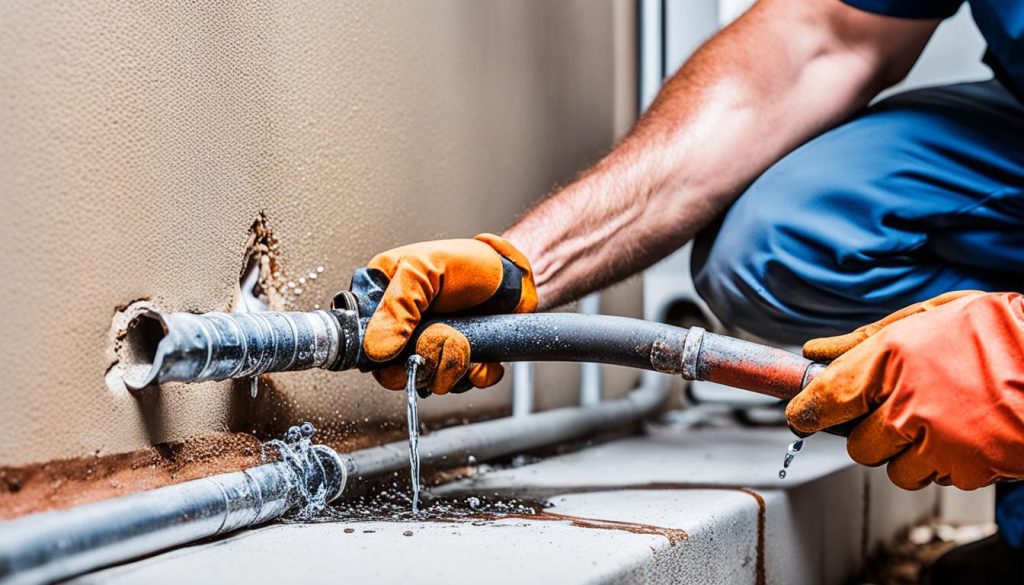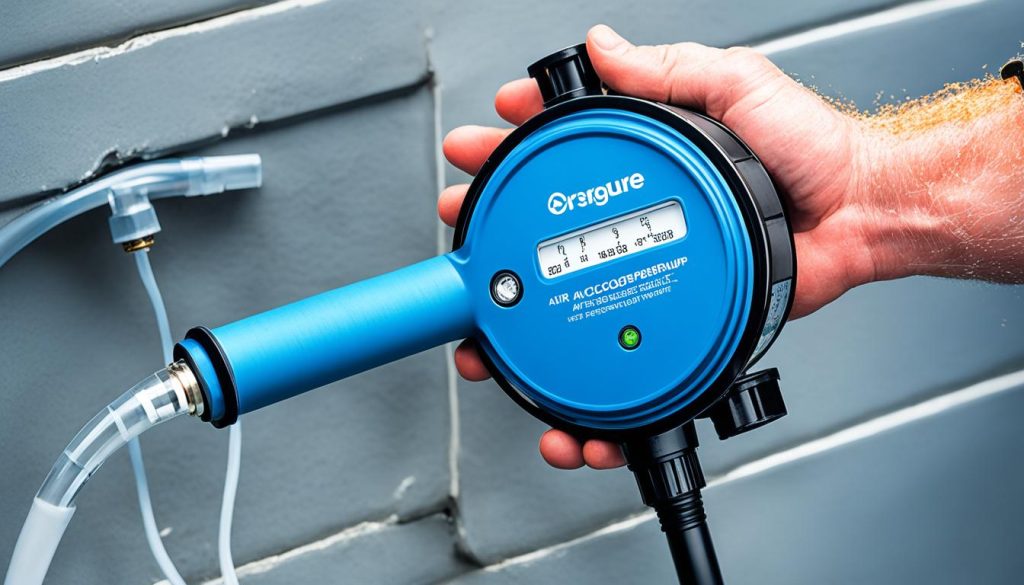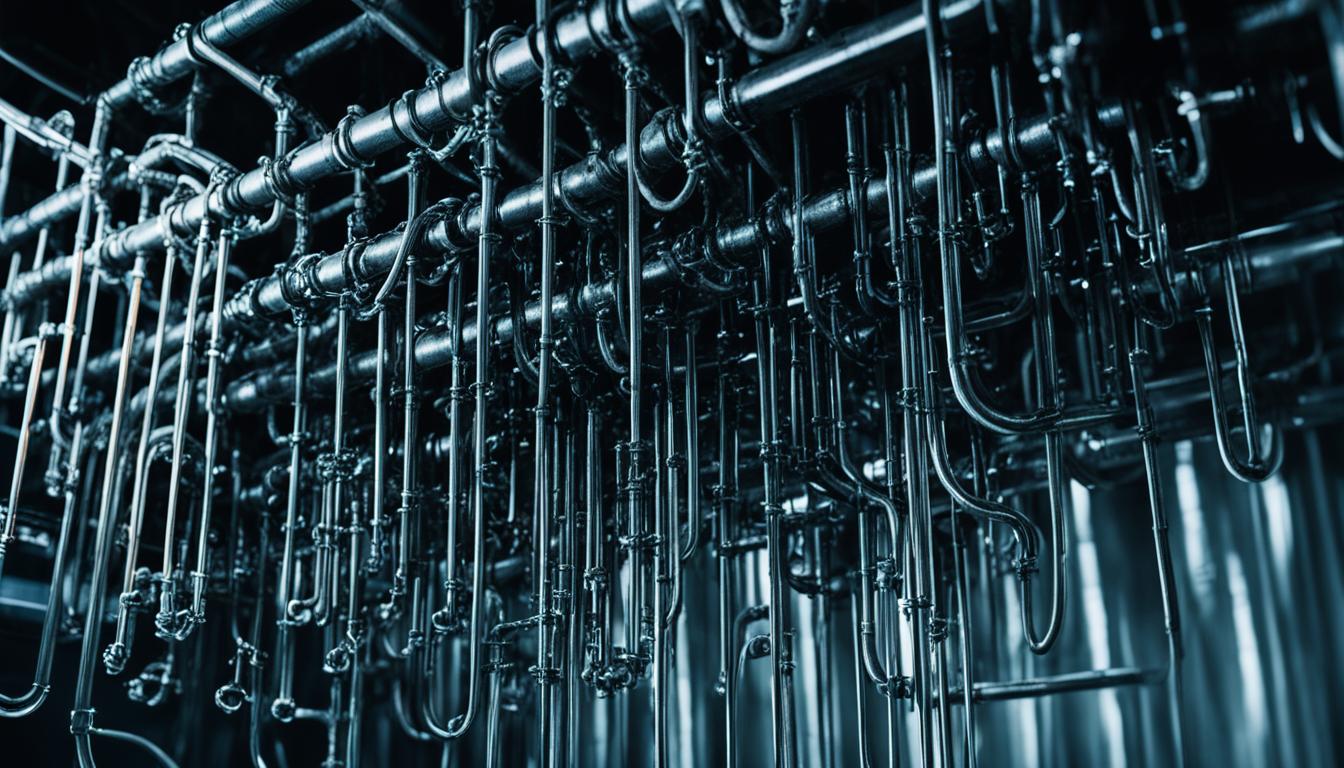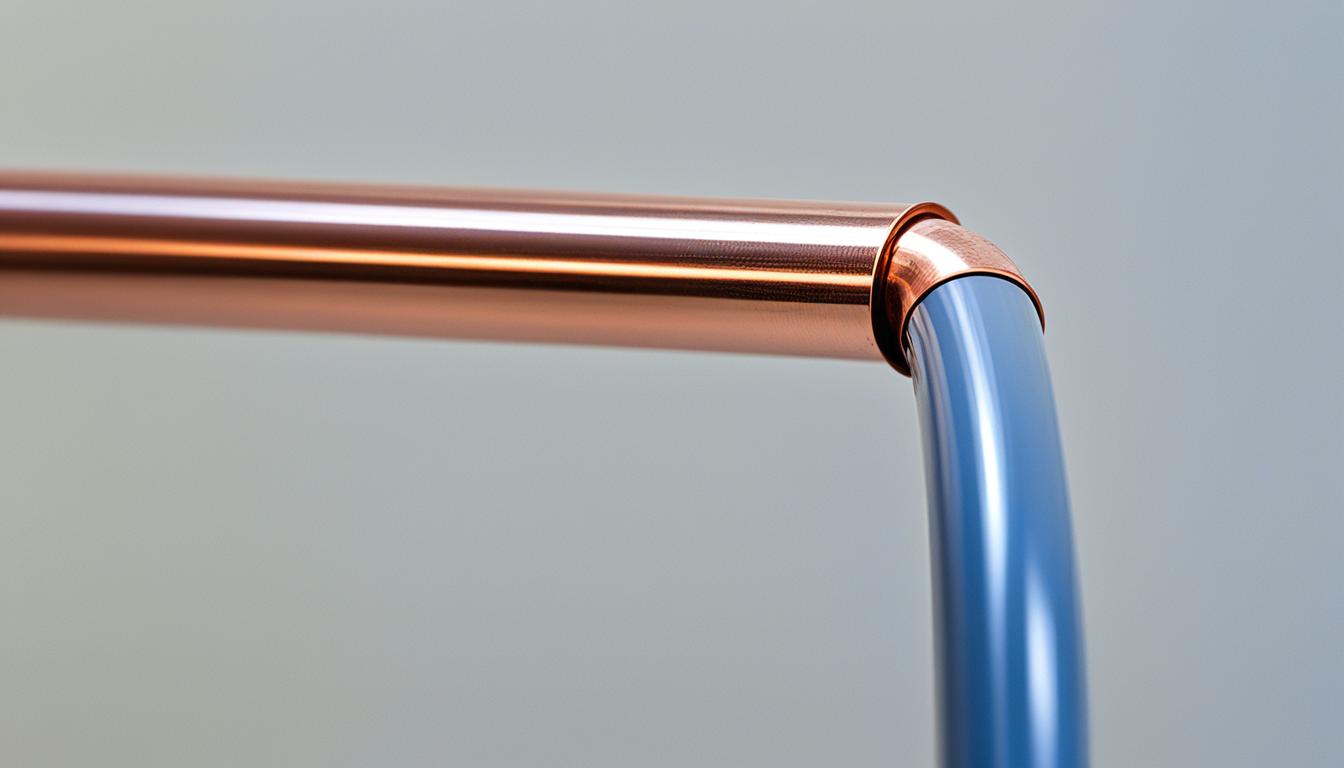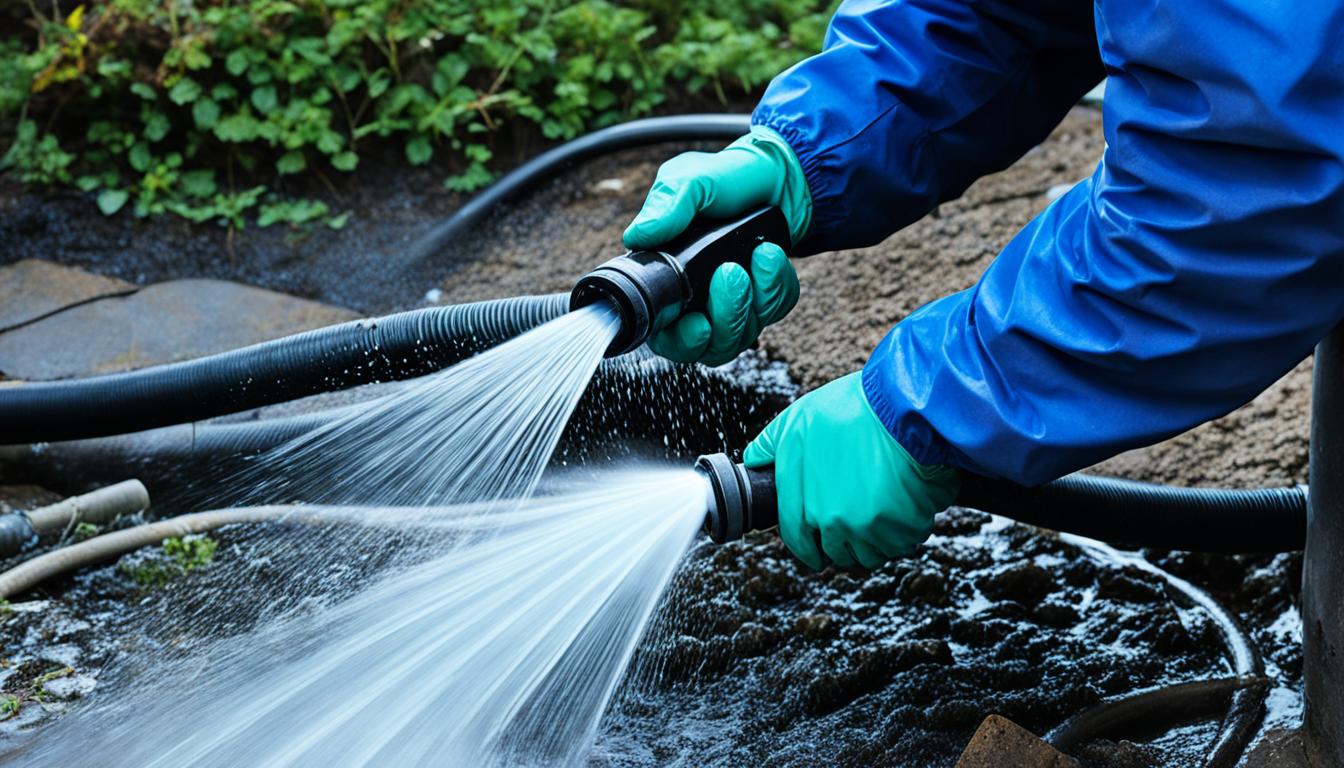Unclog Water Pipes Easily: Proven Methods
Did you know that clogged water pipes can lead to a staggering 10,000 gallons of wasted water per year in the average household? That’s equivalent to 270 showers or 2,000 toilet flushes! Dealing with clogs in your water pipes can not only be frustrating, but it can also have a significant impact on your water consumption and utility bills. Luckily, there are several proven methods that can help you unclog your water pipes easily and prevent further damage.
Key Takeaways:
- Regular maintenance and prevention measures can help reduce the risk of clogged water pipes.
- Pipe removal and cleaning, pipe replacement, and the air pressure method are effective ways to unclog water pipes.
- Using specialized plumbing tools such as plungers, closet augers, and wire drain snakes can help clear clogs in sinks, toilets, and showers.
- Chemical-free cleaners and a mixture of baking soda and vinegar are great alternatives for keeping your drains clear.
- Seeking professional help from a reputable plumbing service like Bell Plumbing and Heating can ensure that your water pipes are unclogged properly.
Pipe Removal and Cleaning
When it comes to unclogging water pipes, one effective method that plumbers use is pipe removal and cleaning. This process involves locating the pipes that are clogged and detaching them from the rest of the plumbing system. Powerful pipe cleaners are then employed to thoroughly remove mineral deposits and build-up from the inside of the pipes, ensuring a proper restoration of water flow.
Mineral deposits, such as calcium and magnesium, can accumulate inside the pipes over time, causing blockages and reducing water flow. These deposits are often a result of hard water, which is common in many areas. By using powerful pipe cleaners, plumbers can break down and dissolve these mineral deposits, restoring the pipe’s functionality and improving water flow.
Once the cleaning process is complete, the pipes are carefully restored to their original position in the plumbing system. At this point, it’s crucial to test the water flow to ensure that the clog has been effectively cleared. Only with a successful restoration of water flow can homeowners rest assured that their plumbing system is back to normal.
For pipe removal and cleaning, it’s recommended to rely on the expertise of professional plumbers, who have the necessary tools and experience to tackle stubborn clogs and mineral deposits. They can assess the extent of the clog and determine if pipe removal and cleaning is the most suitable solution.
By opting for pipe removal and cleaning, homeowners can effectively eliminate mineral deposits and restore water flow in their pipes. This method is particularly beneficial for addressing blockages caused by mineral deposits and other impurities in the water supply.
To summarize, pipe removal and cleaning is a powerful method used by plumbers to unclog water pipes and restore optimal water flow. Whether it’s mineral deposits or other impurities, this technique effectively tackles stubborn clogs, ensuring the uninterrupted supply of clean, flowing water throughout the home.
| Benefits of Pipe Removal and Cleaning | Drawbacks |
|---|---|
|
|
Pipe Replacement
In cases where the clogging has become extreme or the pipe is made from corroded older material, pipe replacement is often necessary. I will identify the pipes that are causing the trouble and remove them. I will then replace them with new pipes, usually made of more corrosive-resistant material such as copper, PEX, or CPVC. The new pipes may also have a larger diameter to reduce water pressure and prevent future clogs. Pipe replacement is a common solution for severe clogs that cannot be cleared through other methods.
To illustrate the benefits of pipe replacement, take a look at the following table that compares the properties of different pipe materials.
| Pipe Material | Corrosion Resistance | Durability | Water Flow Efficiency |
|---|---|---|---|
| Copper | High | Excellent | High |
| PEX | High | Good | High |
| CPVC | High | Good | High |
Note: The table above demonstrates that these pipe materials offer superior corrosion resistance, durability, and water flow efficiency compared to corroded pipes. The larger diameter of the new pipes also helps prevent future clogs by reducing water pressure.
Air Pressure Method
When it comes to unclogging water pipes, plumbers have a powerful tool in their arsenal: the air pressure method. This technique, specifically designed for water supply pipes, can effectively clear faucet clogs caused by dislodged corrosion, calcite, or other deposits.
Here’s how the air pressure method works:
- Plumbers attach an air hose line to the faucet that is affected by the clog.
- They carefully direct a blast of air pressure into the faucet, aiming to dislodge any built-up deposits.
- After applying the air pressure, they run the water to check for any dislodged debris and to ensure that the water flow has been restored.
The air pressure method is highly effective for clearing clogs in water supply pipes, offering a quick and efficient solution to restore proper water flow. Plumbers rely on this technique to resolve faucet clogs caused by various materials, including dislodged corrosion and calcite deposits.
Advantages of the Air Pressure Method
Using air pressure to unclog water pipes offers several advantages:
- Efficiency: The blast of air pressure can quickly dislodge deposits, restoring water flow in a matter of minutes.
- Avoids Chemicals: The air pressure method is a chemical-free solution, making it an environmentally friendly option.
- No Pipe Removal: Unlike other methods that involve pipe removal and cleaning, the air pressure method can clear clogs without the need for extensive plumbing work.
- Cost-Effective: The air pressure method is a cost-effective solution that can save homeowners from potentially costly repairs and replacements.
Overall, the air pressure method is a reliable technique for clearing faucet clogs and restoring the flow of water in your home’s plumbing system. Plumbers trust this method to dislodge deposits and ensure the smooth operation of your faucets.
Comparison of Unclogging Methods
To better understand the effectiveness of the air pressure method, here’s a comparison of different unclogging methods:
| Unclogging Method | Pros | Cons |
|---|---|---|
| Air Pressure Method | Quick and efficient Chemical-free No pipe removal required |
May not work for severe clogs Requires specialized equipment |
| Pipe Removal and Cleaning | Thorough removal of deposits Restores water flow |
Disruptive and time-consuming Requires advanced plumbing knowledge |
| Pipe Replacement | Eliminates severe clogs Long-lasting solution |
Expensive Requires professional installation |
| Using Plumbing Tools | Effective for specific types of clogs Accessible and affordable tools |
Limited to certain types of blockages Requires proper technique and caution |
As shown in the table above, each unclogging method has its advantages and limitations. However, the air pressure method stands out as a quick and chemical-free option for clearing faucet clogs caused by dislodged corrosion, calcite, or other deposits.
Using Plumbing Tools
If you’re dealing with clogs in sinks, toilets, or showers, there are specialized plumbing tools that you can use to clear them. Plungers, closet augers, and wire drain snakes are all great options for tackling stubborn clogs.
Plungers
Plungers are excellent for unclogging sinks. Make sure to use the right technique and cover the overflow hole to create hydraulic pressure. By creating a tight seal and applying strong, repeated plunges, you can effectively dislodge the clog and restore proper drainage.
Closet Augers
If you’re facing a clog in your toilet, a closet auger is the tool to reach for. Designed specifically for snaking out toilets, a closet auger can bust up clogs or hook onto the obstruction and pull it back through the bowl. With its long, flexible cable, it can reach deep into the pipes to clear even the toughest clogs.
Wire Drain Snakes
For clogs in sinks or showers, a wire drain snake can be a lifesaver. By removing the pop-up assembly in the sink or covering the overflow in the shower, you can feed the wire into the drain and use it to break up the clog. The twisting action of the wire helps to dislodge the blockage, allowing water to flow freely once again.
These specialized plumbing tools are readily available at hardware stores or home centers. If you’re unsure about using them yourself, you can always hire a clog-clearing service to do the job for you.
Comparative Table of Plumbing Tools
| Tool | Function | Suitability | Availability |
|---|---|---|---|
| Plungers | Creates hydraulic pressure to dislodge clogs | Sinks | Widely available |
| Closet Augers | Specifically for snaking out toilets | Toilets | Available at plumbing supply stores |
| Wire Drain Snakes | Breaks up clogs in sinks and showers | Sinks, showers | Available at hardware stores |
Prevention and Maintenance Tips
Preventing clogged water pipes is crucial for maintaining smooth water flow in your home. By following these simple tips, you can reduce the risk of blockages and avoid the hassle of dealing with clogged drains.
Firstly, using drain covers is a great way to prevent hair and debris from entering the pipes. These covers act as a barrier, catching any potential clog-causing materials before they can cause any trouble. Remember to clean the drain covers regularly to ensure optimal performance.
In addition, it’s important to practice proper drain maintenance. Avoid dumping waste, such as food scraps or grease, down the sink or toilet. These substances can solidify and create stubborn clogs that are difficult to remove. Instead, dispose of them in the trash or recycle bin.
To keep your drains flowing freely, consider using chemical-free cleaners or a simple baking soda and vinegar solution. These natural options can effectively break down organic debris and prevent clogs without the harmful effects of harsh chemicals. Regularly pouring this mixture down the drain and following it with hot water can help maintain clear pipes.
By incorporating these preventative measures into your routine, you can minimize the need for unclogging methods and ensure the longevity of your plumbing system. Remember, proper drain maintenance and the use of drain covers, along with chemical-free cleaners or a baking soda and vinegar solution, are essential for keeping your water pipes free from clogs.
Source Links
- https://www.thisoldhouse.com/plumbing/21164644/how-to-clear-any-clogged-drain
- https://bellplumbing.com/blog/2014/03/3-methods-of-fixing-clogs-in-water-lines/
- https://alwaysplumbing.ca/blog/proven-ways-to-unclog-your-shower-drain/
- Investing Wisely: How Windows & Doors in Boost Property Value and Financial Health - April 24, 2025
- The Financial Impact of Personal Injuries: Why Legal Help Matters for Business Owners - April 16, 2025
- The Hidden Financial Costs of Domestic Assault: What Business Owners Need to Know - April 16, 2025
